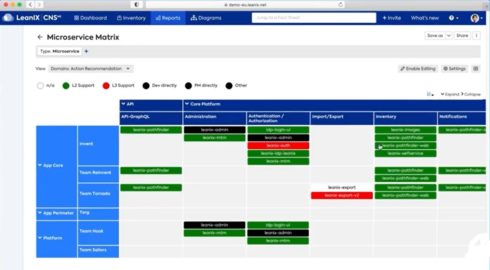
The enterprise architecture and cloud governance company LeanIX made new SaaS management and microservices updates to its portfolio this week. The company announced it has acquired Cleanshelf, a SaaS management provider; and added Microservice Intelligence to its Continuous Transformation Platform.
Cleanshelf’s software provides an automated view of all SaaS applications in an enterprise, simplifies management and enables resource optimization, according to the company.
LeanIX went on to explain that while SaaS adoption is rapidly increasing, it’s happening in a decentralized way, making it difficult to manage costs, security risk and data privacy.
RELATED CONTENT: The resurgence of enterprise architecture
Cleanshelf believes by automatically identifying SaaS applications throughout the enterprise and detecting unused licenses, it can minimize costs by about 15% in the first year. It’s tool is based on integrations with Enterprise Resource Planning (ERP) tools, spend and contract management solutions as well as identity and single-sign-on (SSO) providers.
“This technology is a perfect match for LeanIX, and as of today, we are adding Cleanshelf’s 40 team members spread across San Francisco, Denver, and Ljubljana to our team. Together we will grow as one to deliver a single outstanding product experience to customers and partners,” André Christ, co-founder and CEO of LeanIX, wrote in a post.
LeanIX is also helping DevOps and engineering teams manage the growing complexity of microservices with the newly announced Microservice Intelligence.
“Increasing the number of microservices in any organization calls for DevOps teams to manage them across the landscape to achieve development efficiency. It also means companies need to invest in new tools to manage their microservice landscape. At a minimum, these tools must provide visibility across the microservice landscape with automatic discovery and cataloging capabilities, as well as provide insights to measure development KPIs such as deployment frequency,” Marion Richter, directly or product marketing at LeanIX, wrote in a post.
Microservice Intelligence automatically creates a microservice catalog to provide more transparency and visibility into cloud-native apps, ownership and dependencies.
In addition, it monitors development frequency, MTTR and failure rates of software services; and automatically maps libraries and versions to microservices to identify and prioritize patches and reduce open-source vulnerabilities.
“Continuous transformation does not stop by migrating to the cloud,” said Christ. “Virtually every company is now a tech company and increasingly is delivering in-house software. Microservice Intelligence helps customers navigate the microservice landscape and reduce the complexity that occurs when decomposing the monolith into more loosely coupled services.”







